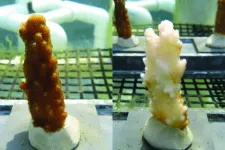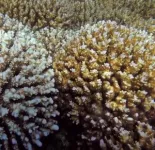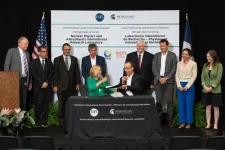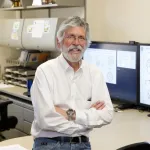(Press-News.org) UNIVERSITY PARK, Pa. — If, as the saying goes, ‘nothing in life is free,’ then corals might pay a price for being resilient to climate change. Indeed, the prevailing belief among scientists has been that corals must suffer reduced growth or other tradeoffs when they partner with symbiotic algae that help them tolerate warmer water. Yet, new research led by Penn State demonstrates that certain corals can have their cake and eat it too, and as a result, these coral-symbiont partnerships may come to dominate reef ecosystems in a climate-changed future.
“Our findings refute the general perception that reef-building corals with thermally tolerant algal symbionts grow poorly,” said Todd LaJeunesse, professor of biology, Penn State. “Instead, these warm-adapted partnerships better tolerate severe marine heatwaves and are likely to expand ecologically and dominate reef ecosystems in the future. While reefs of the future may not look pretty — with low diversity and greatly diminished ecosystem services — the resilient animals left behind will likely continue to provide food and habitat for other animals, and some reef growth to the ecosystems they’ve created.”
LaJeunesse explained that coral reefs are geologic structures created by coral colonies comprising tiny individual sea-anemone-like polyps whose tissues contain dense populations of photosynthetic algae, called ‘dinoflagellates.’ These dinoflagellates — which researchers call ‘symbionts’ — vary in their ability to tolerate high temperatures. When the ocean gets too warm, many symbiont species die, and their coral hosts die along with them. And when coral reefs collapse, fisheries, tourism and ecosystem services, such as hurricane buffers, are also at risk.
According to LaJeunesse, the first documentation of differences in coral mortality based on the species of symbiont present occurred in the Eastern Pacific Ocean following the 1997-1998 El Niño Southern Oscillation event when water temperatures were 2-4°C warmer than historical average temperatures. Following that event, he said, corals that hosted Durusdinium glynnii symbionts survived, while corals that hosted Cladocopium latusorum symbionts died.
“Clearly,” said Mark Warner, professor of marine science and policy, University of Delaware, “corals that associated with D. glynnii were at an advantage during that extreme heat event, but does hosting these temperature-resistant symbionts come at a cost? Previous research has suggested that the costs of thermal tolerance manifest as reduced nutrient translocation from symbiont to host and significant negative physiological tradeoffs, such as reduced growth and reproductive success. We wanted to know if a similar tradeoff could occur in corals and whether this could affect the fate of coral reef ecosystems.”
Kira Turnham, lead author of the study, which published today (July 19) in Proceedings of the Royal Society B, explained that to investigate possible tradeoffs in thermally tolerant partnerships, the research team compared the growth and reproduction of Pocillopora corals hosting the thermally tolerant D. glynnii symbiont and the more sensitive C. latusorum symbiont.
“These symbioses are common throughout the Indian and Pacific oceans, representing co-evolved and ecologically successful relations,” she said.
Specifically, the team measured skeletal growth, total mass increase and calcification rates — or the rate at which corals produce calcium carbonate, which is a measure of their growth. The team also measured reproductive output and response to thermal stress to assess the functional performance of these partner combinations.
“We found that D. glynnii provided the capacity to endure water temperatures that compromise most coral-dinoflagellate mutualisms without noticeable tradeoffs,” said Turnham. “This partner combination grows and reproduces just as well as the more temperature-sensitive partnership.”
Turnham noted that the differences in performance and function between the two partnerships were apparent only during experimental heating, highlighting the ability of D. glynnii to tolerate higher temperatures and provide heat tolerance to their hosts. The team is also studying similar coral-algal mutualisms involving numerous coral species in the Western Pacific nation of Palau to determine the breadth of these findings.
“This study highlights the contextual importance and incredible biology of coral symbioses,” said Turnham. “By investigating the coevolutionary history of the symbioses, providing a contextual lens and using improved symbiont species recognition, we can make more meaningful predictions about the persistence of corals as oceans continually warm from climate change.”
Other authors on the paper include Matthew Aschaffenburg, University of Delaware; Tye Pettay, University of South Carolina Beaufort; David Paz-García, Centro de Investigaciones Biológicas del Noroeste; Hector Reyes-Bonilla, Universidad Autónoma de Baja California Sur; Jorge Pinzón, University of Texas at Arlington; Ellie Timmins, Penn State; Robin Smith, University of the Virgin Islands; and Michael McGinley, University of Delaware.
The National Science Foundation supported this research.
END
Some corals may survive climate change without paying a metabolic price
These resilient corals may dominate reef ecosystems of the future
2023-07-19
ELSE PRESS RELEASES FROM THIS DATE:
Study shows differences in how patients with heroin use disorder process drug and reward cues
2023-07-18
An Icahn School of Medicine at Mount Sinai study sheds new light on some of the underlying neurobiological mechanisms of opioid addiction, which accounted for three-quarters of the more than 100,000 fatal drug overdoses in the United States in 2021.
The Mount Sinai researchers found that inpatients with heroin use disorder exhibited a bias in favor of processing drug cues over cues related to natural, non-drug rewards, as observed during passive viewing of the cues and when the patients were asked to try two emotional regulation strategies. Results of the study were published in the July 12 issue of the American Journal ...
How to track animal of legend? Look to the poop
2023-07-18
How do you study a predator with both camouflage and stealth that make it virtually invisible in the forest?
Even jaguars poop.
A team of researchers led by the University of Cincinnati applied genetic and isotopic analyses to jaguar scat to investigate the habitat needs of the big cats in the Mountain Pine Ridge Forest Preserve of Belize in Central America. The study demonstrates a novel and noninvasive technique for identifying the landscape use and conservation needs of elusive wildlife.
Researchers used scat-detecting dogs named Billy and Bruiser to find telltale evidence left behind by jaguars ...
Researchers identify new method to reverse effects of fentanyl
2023-07-18
According to the Centers for Disease Control, 100,000 Americans die each year from an overdose, most due to the use of synthetic opiates like fentanyl. While naloxone, currently the only an antidote for opiate overdose, has become more common, it is less effective against fentanyl-class synthetic opioids.
Researchers at Indiana University have identified a new method of reversing the effects of fentanyl, which is 50 to 100 times stronger than morphine. Their study, published in the Journal of Medicinal Chemistry, could lead to a new way to reverse overdoses either through a new product or working synchronously with naloxone.
"The synthetic opiates bind very ...
Wilber earns GSA’s 2023 Donald P. Kent Award
2023-07-18
The Gerontological Society of America (GSA) — the nation’s largest interdisciplinary organization devoted to the field of aging — has chosen Kathleen Wilber PhD, FGSA, of the University of Southern California (USC) as the 2023 recipient of the Donald P. Kent Award.
This distinguished honor is given annually to a GSA member who best exemplifies the highest standards for professional leadership in gerontology through teaching, service, and interpretation of gerontology to the larger society. It was established in 1973 in memory ...
Almeida earns GSA’s 2023 Robert W. Kleemeier Award
2023-07-18
The Gerontological Society of America (GSA) — the nation’s largest interdisciplinary organization devoted to the field of aging — has chosen David Almeida, PhD, FGSA, of The Pennsylvania State University as the 2023 recipient of the Robert W. Kleemeier Award.
This distinguished honor is given annually to a GSA member in recognition for outstanding research in the field of gerontology. It was established in 1965 in memory of Robert W. Kleemeier, PhD, a former president of the Society whose contributions to the ...
New joint French-U.S. laboratory to advance fundamental nuclear physics and astrophysics research being established at the Facility for Rare Isotope Beams at Michigan State University
2023-07-18
EAST LANSING, Mich. — Michigan State University (MSU) and the French research organization, Centre National de la Recherche Scientifique, or CNRS, today signed an agreement to establish the International Research Laboratory on Nuclear Physics and Astrophysics (IRL NPA) during a ceremony at the Facility for Rare Isotope Beams (FRIB) at MSU.
CNRS has nearly 80 international research laboratories worldwide, and IRL NPA at FRIB is the first dedicated to nuclear physics and astrophysics.
Leveraging FRIB’s world-unique research capabilities, the IRL NPA will be located at FRIB and dedicated to answering fundamental nuclear physics and astrophysics research questions.
With ...
Angel earns GSA’s 2023 James Jackson Outstanding Mentorship Award
2023-07-18
The Gerontological Society of America (GSA) — the nation’s largest interdisciplinary organization devoted to the field of aging — has chosen Jacqueline L. Angel, PhD, FGSA, of the University of Texas at Austin as the 2023 recipient of the James Jackson Outstanding Mentorship Award.
This distinguished honor is given annually and recognizes individuals who have exemplified outstanding commitment and dedication to mentoring minority researchers in the field of aging. It was renamed in 2021 in memory of James Jackson, PhD, FGSA, a pioneering psychologist in the fields of race and culture and the impact of racial disparities on minority health, and himself ...
Dry manufacturing process offers path to cleaner, more affordable high-energy EV batteries
2023-07-18
The lithium-ion batteries used to power electric vehicles are key to a clean energy economy. But their electrodes are usually made using a wet slurry with toxic solvents, an expensive manufacturing approach that poses health and environmental risks.
Early experiments at the Department of Energy’s Oak Ridge National Laboratory have revealed significant benefits to a dry battery manufacturing process. This eliminates the solvent while showing promise for delivering a battery that is durable, less weighed down by inactive ...
UCLA biobank study reveals disease risk, heath care use among LA’s diverse population
2023-07-18
A new study of UCLA Health’s large genetic biobank is giving researchers new insights into the disease risks faced by the region’s diverse communities and their access to health care. The effort, published in Nature Medicine, may prove useful in developing personalized medicine and treatment approaches to groups often overlooked by the medical system.
UCLA Health researchers identified 376 population clusters based on shared genetic ancestry by leveraging information from nearly 36,000 patients enrolled in the UCLA ATLAS Precision Health Biobank. The ATLAS ...
Researchers achieve historic milestone in energy capacity of supercapacitors
2023-07-18
EL PASO, Texas (July 18, 2023) – In a new landmark chemistry study, researchers describe how they have achieved the highest level of energy storage — also known as capacitance — in a supercapacitor ever recorded.
The study, led by Luis Echegoyen, Ph.D., professor emeritus at The University of Texas at El Paso, and Marta Plonska-Brzezinska, Ph.D., of the Medical University of Bialystok, Poland, was recently featured in the journal Scientific Reports, which is published by leading research publisher Nature Portfolios.
Supercapacitors ...
LAST 30 PRESS RELEASES:
Highly stable self-rectifying memristor arrays: Enabling reliable neuromorphic computing via multi-state regulation
Composite superionic electrolytes for pressure-less solid-state batteries achieved by continuously perpendicularly aligned 2D pathways
Exploring why some people may prefer alcohol over other rewards
How expectations about artificial sweeteners may affect their taste
Ultrasound AI receives FDA De Novo clearance for delivery date AI technology
Amino acid residue-driven nanoparticle targeting of protein cavities beyond size complementarity
New AI algorithm enables scientific monitoring of "blue tears"
Insufficient sleep among US adolescents across behavioral risk groups
Long COVID and recovery among US adults
Trends in poverty and birth outcomes in the US
Heterogeneity of treatment effects of GLP-1 RAs for weight loss in adults
Within-person association between daily screen use and sleep in youth
Low-dose lithium for mild cognitive impairment
Catheter ablation and oral anticoagulation for secondary stroke prevention in atrial fibrillation
A new theory of brain development
Pilot clinical trial suggests low dose lithium may slow verbal memory decline
Bioprinting muscle that knows how to align its cells just as in the human body
A hair-thin fiber can read the chemistry of a single drop of body fluid
SwRI develops magnetostrictive probe for safer, more cost-effective storage tank inspections
National report supports measurement innovation to aid commercial fusion energy and enable new plasma technologies
Mount Sinai, Uniformed Services University join forces to predict and prevent diseases before they start
Science of fitting in: Do best friends or popular peers shape teen behavior?
USF study: Gag grouper are overfished in the Gulf; this new tool could help
New study from Jeonbuk National University finds current climate pledges may miss Paris targets
Theoretical principles of band structure manipulation in strongly correlated insulators with spin and charge perturbations
A CNIC study shows that the heart can be protected during chemotherapy without reducing antitumor efficacy
Mayo Clinic study finds single dose of non-prescribed Adderall raises blood pressure and heart rate in healthy young adults
Engineered immune cells show promise against brain metastases in preclinical study
Improved EV battery technology will outmatch degradation from climate change
AI cancer tools risk “shortcut learning” rather than detecting true biology
[Press-News.org] Some corals may survive climate change without paying a metabolic priceThese resilient corals may dominate reef ecosystems of the future






